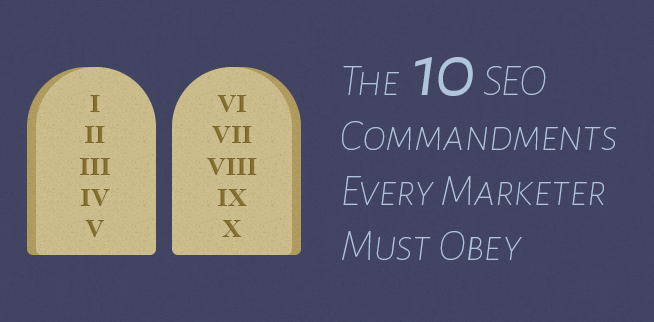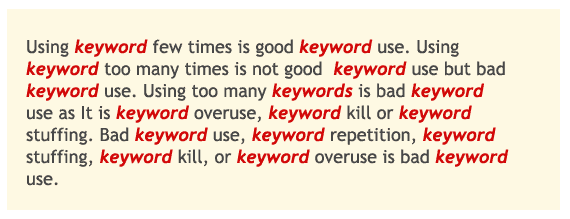Steph W. from SEOPressor


...help you check your website and tell you exactly how to rank higher?


76
score %
SEO Score

Found us from search engine?
We rank high, you can too.
SEOPressor helps you to optimize your on-page SEO for higher & improved search ranking.
By vivian on March 1, 2016

There’s a lot of old, outdated, and just plain wrong information about SEO floating around out there on the Web. The art of search engine optimization is changing, but it doesn’t need to be complicated. Built your SEO strategy around these ten SEO Commandments and you can’t go wrong.
Well, you can, but it’ll be much, much easier to get the results you want.
Let’s zoom in on the Ten Commandments of modern SEO:
For most of the modern history of the search engine, links from other sites to yours – backlinks – were the single most important factor in improving your presence in search results. Links were thought of as “editorial votes” in the original research that spawned Google: The more “votes,” the more trustworthy your site was expected to be.
These days, links are still important – but the game is changing fast. The most useful links are those from sites that are already established and respected in your niche (which Google calls authority sites.) The links you can buy for $5 per thousand on any marketplace site, though? Forget them – automated or otherwise unnatural links can tank your results.

Google is getting smarter, but it still needs you to use keywords in order to understand what your site is about. Keywords should be based on what your potential customers are searching for, and they need to be used strategically. It makes perfect sense to use keywords in your page titles, some of the internal headers, and here and there throughout each page’s text.
The problem comes in when overzealous webmasters try to “stuff” keywords everywhere they’ll fit. Sure, you could probably fit your keywords into every header – maybe even every sentence – but you should resist the urge. Google is notorious for introducing brand new penalties for “over-optimization” that will leave you fixing old pages for months. While there’s no hard-and-fast rule, a keyword density of 1%-2% is just fine.

If links aren’t the most important thing in SEO success anymore, what is? Simply, the answer is content. Once you understand who your Web visitors are and what keywords reflect their needs, content should become the cornerstone of your strategy. Blog posts are the bread and butter of most sites, but infographics, videos, testimonials, case studies, and more all have a role to play.
Why content? Search engines have been moving toward rewarding high-quality content for years now, but up until recently, they had few resources for determining what was really “the best.” Now, search engines are getting smarter – and getting closer to deciphering which content is truly helpful, timely, informative, and relevant. This trend is bound to continue, so get ahead of it now!

Content copied directly from another site is stolen content, and it has never had a positive impact on search results. If you’ve taken content from another source, then for all intents and purposes, the source already got all the search mojo you can possibly gain from it. It’s far more likely that you’d be hit by a duplicate content penalty now or in the future.
What about “spun” content? That illegible gibberish with certain words switched to synonyms may have worked once, but those days are gone. A portion of today’s Google searches are handled by machine learning – that is, artificial intelligence. As time goes on, search engines will get better at determining which words don’t fit, making it easier to flag spun content.
Although there are lots of technical factors behind SEO success, it’s just as important to know your readers well. Only by understanding your readers can you consistently develop content that will make a positive difference for them. That begins by understanding what questions they’re trying to answer when they go online and creating content that provides answers.
From there, how do you build a relationship with people you might never interact with? That requires you to be savvy and read between the lines. Give your visitors a reason to visit again with consistent updates. Provide a user-friendly experience light on obnoxious distractions. Develop a privacy policy and make it clear you’ll keep any personal information safe.
Did this ever work? The jury is out on how this shady practice – going into articles’ comments sections and spamming either a naked link or a link and keyword – became so popular. One thing is for sure: If you don’t plan to build a good reputation on a site or forum, then trying to share your link will be in vain as your posts get deleted and you get banned.

Spamming comments on websites just to include your link is unethical and harmful to your own website.
Still tempted to do it? Like so many things in SEO, this had a grain of truth to it that’s since evaporated. The prevalence of centralized discussion software like Disqus and Livefyre means it’s now virtually impossible to get any “link juice” from comments. Simply, most search engines don’t recognize them at all. If it won’t drive organic traffic, don’t do it!

Cloaking keywords was likely the first “black hat” SEO technique. Way back in the early years of Google, it was possible to seriously game search results by stuffing keywords – like we just told you not to do – and then changing the color of the text so it would be invisible to your readers. This led to dozens or hundreds of keywords found nowhere else on the page.
These days, it’s laughably easy for even the most basic search engine to find cloaked keywords. Most of them take a dim view of this: The offending page is often severely penalized, or even removed from search results entirely. Funnily enough, some people have moved on to cloaking keywords in their resumes and job applications – and it doesn’t work there, either.

With all this talk of your visitors and the content that titillates them, it might be tempting to expect that SEO has gotten a lot friendlier. You may even have heard the increasingly common refrain: “Write for people, not search engines!” Well, that’s a noble sentiment – but if you don’t pay attention to the search engines’ needs, you won’t get the results you want. Period.
Developing and using keywords is important, but it’s only step one. Modern search engines want to see an XML sitemap so “search spiders” can catalog your site and recognize changes easily. Likewise, it’s a good idea to ensure your site is mobile-friendly – more searches originate from mobile than desktop sources these days, and compatibility is a ranking factor.

There’s nothing wrong with monetizing your site using ads. Google’s AdWords platform is a key part of its business, and no doubt the head honchos at the Big G wouldn’t mind if just about every site was using ads as well as SEO. But no matter what your monetization strategy is, one rule stands out: Don’t compromise on user experience for ads. Ever.
Many of the most recent Google updates have been focused on recognizing a wider range of ad layouts, understanding how ads interact with content, and penalizing sites that use ads too aggressively. Generally speaking, you want to make sure ads don’t interfere with your content in any way and that you use as few advertising blocks as possible on any given page.

So, you’ve done research on your visitors and have a good idea about their needs. You’ve picked keywords and developed content. You have a strategy for bringing in the initial traffic that will help you build momentum. Now, the question remains – what are users actually doing once they get to your site? And if you don’t know, how can you find out?
It wasn’t long ago when a good analytics solution cost thousands in licensing fees. Nowadays, you can get an analytics suite that will track every site visit from start to finish for free courtesy of Google Analytics. No matter what tool you use, learn it well. Dive into users’ behavior, using analytics to figure out the content people like and where they get lost or discouraged.
Related Articles:
Updated: 3 July 2025


Save thousands of dollars (it’s 100x cheaper)

Zero risk of Google penalty (it’s Google-approved)

Boost your rankings (proven by case studies)
Rank High With This Link Strategy
Precise, Simplified, Fast Internal Linking.
